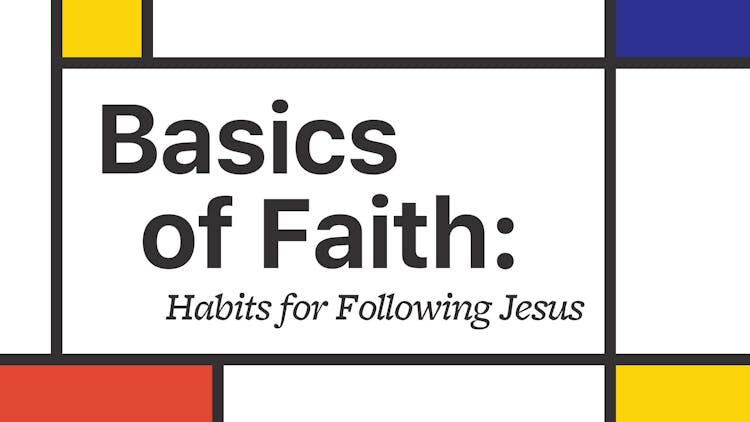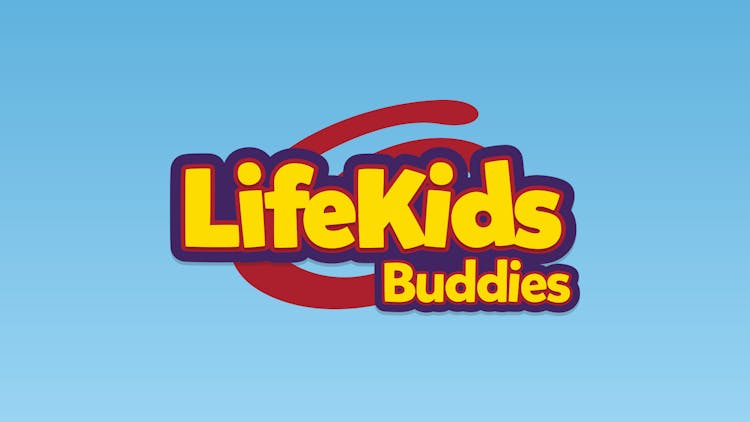I have been an older sister for most of my life, and it’s one of the greatest titles that I hold. My brother and I are your typical, run-of-the-mill sibling pair. However, there’s one major difference between us: our vision.
You see, my brother was born blind. I love the Buddies program at Life.Church because it is the very resource my family prayed for: someone to make my brother feel included, not different.
With this in mind, my family came together to share some of the most crucial things we’ve learned over the years. Our hope is to equip you to make your buddy feel included, safe, and ready to experience the abounding love of God.
Some Best Practices to Support a Child Who Is Blind or Visually Impaired
- Always introduce yourself using your name. Obviously, you’ll use your name to introduce yourself the first time you meet. “Hello! My name is Ms. Abigail. It’s nice to meet you.” But don’t forget to use your name as your identifier every time you meet thereafter. “Hello! It’s me, Ms. Abigail. I’m so glad to see you again.” Guessing games like, “Do you know who I am? Can you tell from my voice?” are generally not considered fun or respectful for children who are blind.
- Take time walking your little buddy around the room. Let them know where the tables, play areas, and any other furniture or toys in your room are. You won’t need to do this with every element of the room each time, but it’s helpful for the first few weeks, and anytime you meet in a new room. It’s helpful to bring the child to any new elements in your room, such as a play set that may rotate into your room one week, but not another.
- Let your little buddy know where you are—and try to keep that consistent. If they want you to stay on their left side, try to remain there. That way, if they have questions or something to tell you, they know where to find you. If you do need to move around or step away, let them know where you’re going and when you’ll be back.
- Introduce the child to other friends in the room. Notice what toys are available in the room and go over the options with them. If they decide they want to play with cars or build towers, sit with them and the other kids already playing with the toys. Introduce your little buddy to the kids playing, and find ways to race cars or build towers together. For example, with the child’s permission, you could place your hand over theirs to help guide where a car is going. Special note: If your little buddy uses a white cane, help the other children in the room understand (if needed) that it is not a toy, and it may not be touched or moved even if it’s not being actively used.
- Verbal cues are your friend. Think about worship for a minute. The on-screen videos show kids how to follow along with the moves. Find ways to verbally explain this to your little buddy. For example, “Right now, we’re going to lift our hands high above our heads. And now, we’re going to squat down close to the floor.” Remember, it’s not about how well they follow along, but more about keeping them involved and engaged.
- Specific verbal cues are your very best friend! Think: How can I make what I’m saying specific? Terms like “over here” or “right there” aren’t helpful. Phrases like, “Reach forward with your right hand to find your toy,” or, “Let’s walk about 10 steps to your left, and we’ll be ready to sit down in our small group,” are super helpful.
- Consider a tactile schedule. If the child you’re supporting seems to be distressed about the time they’re spending with you, or if they’re having a hard time transitioning through the different elements of their experience, a tangible schedule can help! You can use a few bins and place them in a row in an area of your room that’s less used by other kids. Get creative! One simple way you could structure the child’s time would be with three bins. In bin 1, you can put a toy to represent that it’s play time. When it’s time to clean up, they will need to put the toy back into bin 1. Then, they can open the next bin. In bin 2, you can put a fidget toy to represent that it’s time to sit and listen. When it’s time to transition to a craft time, they can put the fidget back and open the next bin. In bin 3, they might find a paper and some scented colored pencils. You can use as many bins or bags as are helpful for the child you’re working serving. Affixing small items onto a board can also work well. Whichever method you choose, keep it consistent, and the child will begin to understand what’s happening in the room much better.
- Ask your little buddy and their family how you can best support them. One of your best resources is the child and their family. Nobody knows your little buddy better than them. So when you have questions, feel free to ask. Speaking from experience, the family will love that you’re reaching out.
This is a broad list of ways you can help your little buddy feel safe, secure, and included during their LifeKids experience. If you want even more specific ways you can best help your buddy, take a look at the tips below!
The Dos and Don’ts of Free Play
- Do make sure the child knows what the toys and free play options are. This can include the rotation toys, jungle gyms, and coloring options. This is also a great time to walk the room with your buddy so that they know where large items and spaces are in the room.
- Don’t assume your buddy knows what options are available. While they may hear some toys based on the sounds they make or the conversations going on around them, it’s always better to make sure you’re communicating all options.
- Tip: If your little buddy likes to explore coloring, ask your campus to purchase some scented colored pencils. This can elevate the experience for a child who is blind or visually impaired.
- Do make your little buddy feel included. If they choose a toy that other kids are playing with, bring them in on the fun! Sit together and introduce them to the other kids. Find ways to include everyone by playing as a group with the toys: racing cars, building the tallest tower, or starting a band.
- Don’t isolate your little buddy. It is easy to think they won’t be able to play with or enjoy the toys in the room. Most of the time, there will be at least one or two options they’ll be interested in.
- Tip: Consider toys with movable parts (like puzzles or the wheels on cars) or sounds (musical shakers or noisemakers from your sensory toys). Depending on the level of vision that your buddy has, they may also enjoy toys with lights.
- Do stay with your little buddy. This is a great time to build your relationship, whether you’re playing in a group or one-on-one. As parents drop off their kids, your buddy may become overwhelmed with the noises and changes. Remember to communicate often, especially if you’re moving around. If they want to play with a toy that’s across the room, bring the child with you rather than going to get it yourself.
- Don’t use this time to get ready for the next part of the experience. It can be tempting to look ahead at the Prop Talk, Picture Pass, and Story Cards. Instead, try to get to the room early so you can review the materials beforehand. Remember, you’re the primary point of contact for your buddy, and it’s crucial that you’re engaging with them during this time.
Transitioning Into Clean Up
Clean Up is a wild two-minutes, no matter who the child is. Here are some helpful ways to include your little buddy.
- Let the child know when Clean Up time is approaching. For example, you can say, “We have about five minutes before Clean Up begins.”
- Bring an empty toy bin directly to the child so they can feel where toys need to go and that it’s time to clean up.
- Gather toys closer to your little buddy to place in the bin.
- You can also set up an assembly line style of Clean Up where your little buddy passes toys to another kid who puts them in the bin.
- Utilize those specific verbal cues to let your little buddy know where the toys are around them. For example, “One of the blocks you were playing with is in front of you on your right side.”
- Help the child transition to where they will sit for the next portion of their experience.
How to Thrive in the Video or More Teacher-Led Portions of the Experience
As you help your little buddy get seated in a small group, think about these things.
- Try sitting behind them instead of next to them. This way they will feel like they are more a part of the group, while knowing you’re still nearby.
- Let them know who is sitting next to them and the name of the small group leader.
- This may need to happen more than once as you kids mill about during the experience.
Think through the different portions of your experience. In the younger Early Childhood rooms, you’ll have a teacher-led Prop Talk. Be sure to quietly describe what’s happening and what the teacher is showing the other children.
- It’s better to over-describe than under-describe. Whisper verbal cues to the child. For example, if the leader is holding up a plastic star, think about the following:
- Is the star flat or 3D?
- Is the star yellow or blue (or any other color)?
- Does the star have any textures?
- How big is it in relation to the size of your little buddy’s hand?
In Crosstown, you may need to help the child through playing a game in the group.
- Make sure you and the child are seated with a little room around you so any motions you need to do for the game don’t accidentally hurt nearby kids.
In all rooms, there will be a video portion where your verbal cues will come in handy!
- Once the video starts, use your discretion to explain what’s going on.
- If the video asks a question based on something visual around them (like a floating object), quietly explain that object to the child.
- Let the child know they can ask you any questions they may have.
Help with learning and doing anything that’s visually led in a video or in the room.
- With the child’s permission, lead them through different hand motions that may accompany the Bible verse they’re learning.
All rooms have music and movement to lead through.
- Stand up and worship with your little buddy when the music starts.
- Use verbal cues to help them follow along with the moves shown on the screen. For example, “Right now, we’re going to lift our hands high above our heads. And now, we’re going to squat down close to the floor.”
- They may prefer to freestyle dance to the music. This can help them process the words and music better. Make sure they have space needed so they don’t accidentally bump into any other kids.
- If they don’t want to dance, that’s okay, too. Again, make sure they’re standing or sitting in a place where they won’t be accidentally trampled on by other dancing kids.
Supporting Through Activity Time and Small Group Discussions
As you help your little buddy get into a small group, think about sitting behind them instead of next to them. This way they will feel like they are more a part of the circle, while knowing you’re still nearby. Here are some other things to consider:
- This may be another time you’ll want to let the child know who is sitting next to them.
- Describe the pictures shown on the Story Cards (remember to whisper to avoid distracting the group).
- If tactile Story Cards are available at your campus, help lead them through the cards as the small group leader reads the cards.
- Is there an activity that requires drawing or coloring? Ask your campus to purchase some scented colored pencils to make the experience more fun. Or, ask your campus to purchase some wax sticks that the child can shape and stick to a paper or beads they can string together to create their own artwork.
Transitioning Back to Parent/Guardian
This can be a stressful time for your little buddy, especially if the noise level increases like it often does.
- Reassure the child that they’ll be picked up soon. Asking them questions about their family can be a great way to distract them.
- Consider using a calming sensory toy.
- Distraction can be a great tool to use.
Remember, this is not an exhaustive list. Each child will have different needs and preferences. The most important thing your little buddy needs is you. You are helping to create a safe environment. You are the familiar voice for this child each week. You are the person they look forward to spending time with.
It’s okay if you don’t feel that way at first, but I promise that with time you’ll watch this unique relationship impact both of your lives in radical ways. Thank you, for saying “yes” to this calling!
Oh! And if you’d like to hear directly from my brother, be sure to check out this article next!


